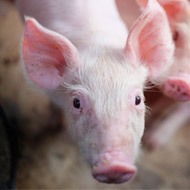Technology used to detect pig facial expressions

“Early identification of pig health issues gives farmers the potential to improve animal wellbeing..."
Scientists are using state-of-the-art technology to detect different emotional states in pigs, which could result in a tool to help farmers monitor health and welfare.
Scotland’s Rural College (SRUC) has teamed up with experts at the University of the West of England (UWE) to capture 2D and 3D facial images of breeding sows in various commercial situations.
Pigs are known to be highly expressive and previous SRUC research has shown they use different facial expressions to signal their intentions to other pigs. Evidence also suggests they use different expressions when they are in pain or under stress.
Images will be processed at UWE Bristol’s Centre for Machine Vision, where various techniques are being developed to automatically identify different emotions. Researchers are hoping to use the technology to recognise facial expressions that are linked to core emotional states, such as happiness or distress.
Once the techniques have been validated, the team plan to develop technology for on-farm use.
Dr Emma Baxter, from SRUC, said: “Early identification of pig health issues gives farmers the potential to improve animal wellbeing by tackling any problems quickly and implementing tailored treatment for individuals. This will reduce production costs by preventing impact of health issues on performance.
“By focussing on the pig’s face, we hope to deliver a truly animal-centric welfare assessment technique, where the animal can ‘tell’ us how it feels about its own individual experiences and environment. This allows insight into both short-term emotional reactions and long-term individual ‘moods’ of animals under our care.”



 The veterinary mental health charity Vetlife is inviting the veterinary community to join it for a sponsored cold-water dip.
The veterinary mental health charity Vetlife is inviting the veterinary community to join it for a sponsored cold-water dip.